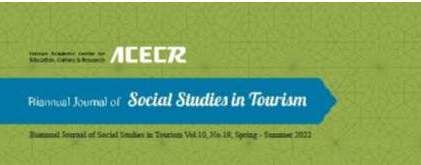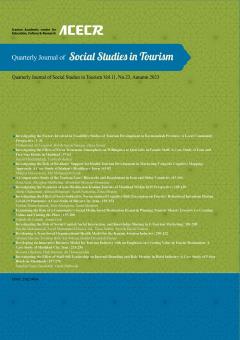Investigating the Scenarios of non-Muslim non-Iranian Tourists of Mashhad Within 2025 Perspective
Subject Areas :
Arash Ghahreman
1
*
,
Ahmad roumiani
2
,
Sareh Nematian
3
,
zahra bostan
4
![]()
1 - Researcher at Department of Sociology of Tourism Institute for Tourism Research, ACECR
2 - lecturer at Ferdowsi University of Mashhad
3 - Researcher at Department of Sociology of Tourism Institute for Tourism Research, ACECR
4 - Researcher at Department of Sociology of Tourism Institute for Tourism Research, ACECR
Keywords: Political Economy, Tourism Policy-making, Scenario, non-local Tourism, Mashhad City,
Abstract :
The uncertainty caused by environmental complexities has made it difficult to forecast the future of Tourism in Mashhad in terms of non-Muslim tourists visiting the city, about whom no sufficient information exists. Therefore, this study sought to investigate the trend of variations in the visits made to Mashhad by non-Muslim tourists using the scenario writing method. To this end, this applied study used the analytical-qualitative approach, collecting the required data through detailed in-person interviews. In this regard, twenty-seven interviews were made in three phases with tourism experts in such fields as sociology, economics, planning, and specialized tourism services. In the first phase, the factors involved in attracting non-Muslim tourists to Mashhad were identified according to the views offered by the experts in interviews using the Delphi technique. In the second phase, the critical driving forces were identified based on two criteria of effectiveness and uncertainty. Finally, the optimistic and pessimistic scenarios concerning the future of non-Muslim tourism in Mashhad were described. The study’s findings revealed that smartizing tourism, making connections between tourism in Mashhad and its neighboring cities, increasing the number of media advertisements, improving the hospitality culture, and promoting a sense of security in the visiting tourists were the most important driving forces at the local level. Therefore, the number of Mashhad’s non-muslim tourists could be increased within the study period by improving IT infrastructure (including electronic trading, and electronic banking), introducing neighboring cities and villages of Mashhad and their tourist attractions, offering instructions regarding hospitality (especially for taxi drivers, business and shop owners), creating tourism police, and providing security in high-trafficking urban places.
آقاجانی، معصومه و فراها نی فر، سعيد. (1394). «گردشگری مذهبی وعوامل مؤثر بر آن (مطالعه موردی ایران)». فصلنامه سياستهای راهبردی و کلان. 43-66.
حسینی، لعیا سادات و سلیمانی، حمزه. (1394). «بررسی تأثیر تبلیغات رسانه¬ای بر جذب گردشگران (مورد مطالعه: جزیره قشم)». دومين کنفرانس بین المللی ابزار و تکنیکها ی مدیریت.
فضل زاده، علیرضا و کريمی زاده شقاقی، لیلا. (1393). «نقش تجارت الکترونیک در صنعت گردشگری». دومین همایش ملی پژوهش ها ی کاربردی در جغرافیا و گردشگری.
قهرمان، آرش؛ اصغرپور ماسوله، احمدرضا و خوارزمی ،اميد. (1399). سنخ شناسی اقامت گردشگران در مشهد. مشهد: رساله دکتری؛ دانشکده ادبيات دانشگاه فردوسی مشهد.
کاپوراسو، جيمز ای و لوين، دیويد پی . (1387). نظريه ها ی اقتصاد سياسی. ترجمه: م عبدالله زاده. تهران: ثالث.
محمدی، تیمور؛ کرمی، مجتبی؛ نجارزاده، نگین و اوغلی، معصومه. (1389). عوامل مؤثر بر تقاضای گردشگری در ایران. فصلنامه اقتصاد مالی, بهار، ص. 114-142.
هزار جريبي، جعفر و نجفي، ملک محمد. (1389). اعتماد اجتماعي و توسعه گردشگري. مطالعات و پژوهشهاي شهري و منطقه اي، زمستان. هفتم، 53-70.
Andonian, A., Kuwabara, T., Yamakawa, N., & Ishida, R. (2016). The future of Japan’s tourism: Path for sustainable growth towards 2020. McKinsey Japan and Travel, Transport and Logistics Practice. Retrieved February. 2018 , 10.
Beery, J. (2012). State, capital, and spaceships: A terrestrial geography of space tourism. . Geoforum. 34-25, 43,
Bocella, N., & Salerno, I. (2018). Tourism Trends and Policies”. Alcune riflessioni sul rapporto OECD 2018. Rivista di Scienze del Turismo-Ambiente Cultura Diritto Economia, (2-1)8 ., 27-19
Britton, S. g. (1982). the political economy of tourism in the third world. annals of tourism research, 9, 331-358.
Campbell. (1997). The Romantic Ethic and Spirit of Modern Consumerism. Oxford: Oxford.
Chang, G. C. (2006). Strategic planning in education: some concepts and steps. Paris: United Nations Educational, Scientific and Cultural Organization.
cole, s. (2012). A POLITICAL ECOLOGY OF WATER EQUITY AND TOURISM A Case Study From Bali. Annals of Tourism Research, 39, 1221–1241.
Dwyer, L., Edwards, D. C., Mistilis, N., Roman, C., & Scott, N. (2009). Destination and enterprise management for a tourism future. Tourism Management. 74-63, (1) 30,
Dwyer, L., Edwards, D., Mistilis, N., Roman, C., Scott, N., & Cooper, C.(2008). Megatrends underpinning tourism to 2020: analysis of key drivers for change.
Fahey, L., & Randall, M. R. (1998). Learning from the Future Competitive Foresight Scenarios. Wiley.
https://www.reference.com. (بدون تاريخ).
Kosow, H., & Gaßner, R.(2008). Methods of future and scenario analysis: overview, assessment, and selection criteria (جلد 39). DEU.
Lennon, J., & Yeoman, I.(2007). Drivers and Scenarios of Scottish Tourism—Shaping the Future to 82-69,(1)32.2015 .
Mair, H. (2012). the political economy of tourism: a critical perspective. annals of tourism research,39,1276-1277.
Mair, H.( 2012) the political economy of tourism: a critical perspective. annals of tourism research, 1276 , 39,
Manzoor, F., Wei, L., & Asif, M. (2019). the contribution of sustainable tourism to economic growth and employment in Pakistan. International journal of environmental research and public health, 3785 , (19) 16
nunkoo, r., & smith, s. l. (2013). the political economy of tourism: trust in government actors, political support, and their determinants. tourism management, 36, 120-132.
nunkoo, r., ramkissoon, h., & gursoy, d. (2012). public trust in tourism institutions. annals of tourism research, 39, 1538-1566.
OECD. (2018). OECD tourism trend and policies. Paris: OECD publisher.
Pan, X., Rasouli, S., & Timmermans, H. (2021). Investigating tourist destination choice: Effect of destination image from social network members. Tourism Management , 104217 ,83
Peterson, G., Cumming, G., & Carpenter, S. (2003). Scenario planning: a tool for conservation in an uncertain world. 366-358 , (2) 17.
Postma, A. (2015). Investigating scenario planning–a European tourism perspective. Journal of Tourism Futures.
Postma, A., & Yeoman, I. (2016). Conceptualizing scenario planning in tourism futures: Vignettes of practice. CAUTHE 2016: The Changing Landscape of Tourism and Hospitality: The Impact of Emerging Markets and Emerging Destinations,, 1185.
Sheng, L. (2011). Foreign investment and urban development: A perspective from tourist cities. Habitat International, 35, 111e117.
Stokowski. (1992). social networks and tourism behavior. American behavioral scientist.
Wan, Y. P. (2013). A comparison of the governance of tourism planning in the two Special Administrative Regions (SARs) of China - Hong Kong and Macao. Tourism Management, 36, 164-177.
Wang, y., & brannwell, b. (2012). Heritage protection and tourism development priorities in Hangzhou, China: A political economy and governance perspective. tourism management, .988-988 , 33.
Webster, M. (2013). Dictionary. Webster.
Xue, L., Navarrete, D. M., & Buzinde, C. N. (2014). Theorizing the concept of alienation in tourism studies. Annals of Tourism Research, 44, 186-199.
Yeoman, I., & McMahon-Beattie, U. (2005). Developing a scenario planning process using a blank piece of paper. Tourism and Hospitality Research. 285-273, (3) 5,
Yeoman, I., Lennon, J., & Black, L. (2005). Foot-and-mouth disease: A scenario of
reoccurrence for Scotland’s tourism industry. Journal of Vacation Marketing.179, (2) 11,190

